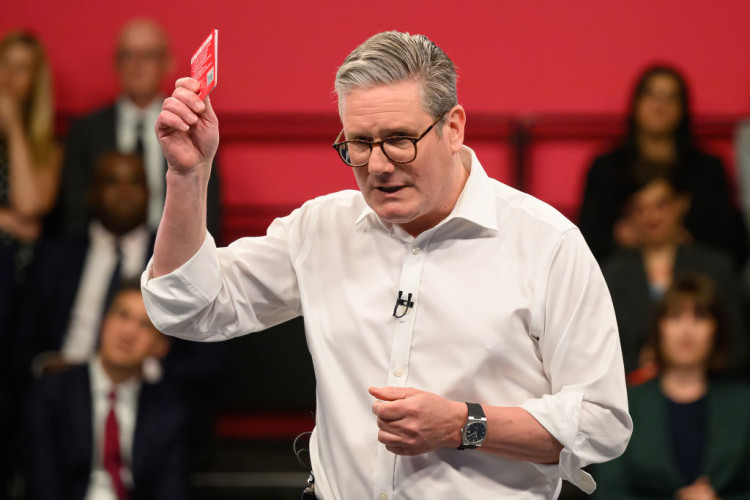Britain’s political commentators think they have spotted flaws in Labour’s new platform. They have missed a more fundamental problem.
“Holding the Opposition to account,” one old Westminster hand dryly observed as journalists dissected Labour’s decision to admit its latest Conservative defector Natalie Elphicke. As Labour has solidified its poll lead, there has been a shift in how the lobby treats Keir Starmer’s party. Gone are the days when Starmer and his colleagues would struggle to lead the evening bulletins or top the BBC news app. What would once be considered technical changes to party platforms, such as Angela Rayner’s workers’ rights plan, are now covered with the fanfare that greets a major government U-turn.
That brave new world was on display as the Shadow Cabinet headed to Essex to launch the party’s new pledge card last week. Where Ed Miliband and Jeremy Corbyn would have been dodging questions about their credibility with the public or party divisions, the current Labour leader found himself facing a different kind of scrutiny. Why weren’t there more numbers on this pledge card? Why wasn’t it ambitious enough? How did it compare to Tony Blair’s 1997 pledges? The Political Editor of the BBC asked Starmer what his choice of attire said about the moment.
Good Times for a Change
The Labour faithful – often resentful at the press for allowing the Conservatives to “play politics on easy mode” – are for once unbothered. The mood in the party is buoyant after the local elections. The launch of the pledge card was well received, with praise for its clarity and the operation that went into accompanying endorsements. Activists on the ground like its functionality, with a digital version that can be downloaded to smartphones for use on the doorstep.
Veterans from past Labour campaigns are also encouraged, albeit for different reasons. There is a sense Labour now has a clearer plan and better dividing lines with the Conservatives. Those on the Blairite wing of the party welcome Starmer’s attempt to forge his own connection with the former PM’s legacy. Some campaigning on the ground welcome the new message on border security, which they see as a more serious message for voters than Labour had pre-2015.
Business leaders might be feeling rather left out. Yet they should be encouraged by the strategic thought that went into the card’s development, along with further signs Labour’s Missions are a meaningful framework for government. Sources praise the influence of former Blair adviser Peter Hyman, who was instrumental in developing the 1997 card and has been helping Starmer develop the arguments in his Missions. The 2024 pledges are seen as offering more guidance to civil servants as they prepare to implement a new Labour government’s agenda.
Means or Ends?
There are loose ends, however. The party’s commitment to planning reform remains strong. But like the Missions, the pledges contain no direct reference to housing. Labour strategists have chosen to deprioritise this in favour of a message on economic stability, though were likely mindful of how divisive homebuilding remains. Pledges on health and education are only applicable to England and will require iteration by Scottish and Welsh Labour – the latter distracted from the general election by infighting over Vaughan Gething’s leadership.
There is also a tension at the heart of the package of pledges as a whole, which may only become more apparent if Labour enters government. Some pledges, like the creation of GB Energy and a new Border Command organisation, are essentially delivery mechanisms, and reflect Starmer’s ‘toolmaker’ preference for tinkering with bureaucratic structures. Others, like those on teacher recruitment and NHS waiting lists, are clearly outcome-focused. They appear much more aimed at the average voter and are fronted by two very practically-minded members of the Shadow Cabinet in Wes Streeting and Bridget Phillipson.
There are no signs of division at the top of the party on these priorities for now. Starmer was at pains to demonstrate the unity of his team in the comms around the pledges, with those more to the left of the party such as Rayner and Miliband given top billing alongside Streeting and Phillipson. But there have been murmurs over the past year about what bodies like GB Energy will actually deliver. And it is not difficult to imagine fault lines opening in a new Labour government between “Meaners” such as Starmer who see new public bodies as a solution to issues, and “Enders” wary of top-down answers to complex problems.
The Conservatives: Desperately Seeking Strategy
As for the current government, even those close to the centre despair of attempts to counter Labour’s message. Rishi Sunak’s speech at Policy Exchange, focused on who is best placed to secure the UK in a more dangerous world, had limited impact. It also marked the reversal of an economy-first approach previously demanded by election strategist Isaac Levido. Tory sources speak of a breakdown in communication between political advisers and civil servants, and express frustration with the lobby as journalists treat Labour as the only show in town.
Yet if the message remains muddled, there are signs of greater clarity in the Tory ground operation. Labour insiders had been baffled by the Conservatives’ decision to stick to their “80:20” strategy, aimed at holding the 80 most marginal seats and gaining another 20. Now reports suggest CCHQ is adopting a more defensive approach, identifying 200 vulnerable seats in need of resource in an echo of Labour’s successful efforts to limit losses in 2010. It remains to be seen if this will deliver a Conservative parliamentary party able to take advantage of the conundrums starting to emerge out of Project Starmer.






